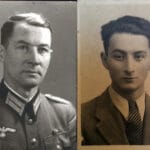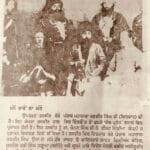Unmasking Lieutenant Speirs: Hero or Ruthless Commander?
Lieutenant Colonel Ronald Speirs. The mere mention of his name likely conjures up vivid images from the acclaimed miniseries “Band of Brothers” – a hardened, steel-nerved officer leading his men through the crucible of World War II. Yet, the Hollywood portrayal only scratches the surface of a deeply complex figure, a man whose actions on and off the battlefield continue to ignite debate: Was he a paragon of wartime heroism or a figure shrouded in shadows, a ruthless commander?
Born in Scotland, Speirs’s path took a distinctly American turn when he immigrated to the United States. As the fires of World War II engulfed the globe, he didn’t merely enlist – he volunteered for the paratroopers, the legendary soldiers who plunged from the sky into the heart of enemy territory. Joining the esteemed 101st Airborne Division, one of the most revered and formidable units in the US Army, Speirs was about to etch his name into the annals of history.
D-Day, June 6th, 1944 – the beaches of Normandy became Speirs’s baptism by fire. Amidst the deafening roar of battle and facing relentless German resistance, he exhibited unwavering courage and tactical acumen under unimaginable pressure. This bravery would become his defining trait in the trials that lay ahead – Operation Market Garden, a daring but ultimately ill-fated attempt to seize bridges in Holland, and the brutal, frozen hellscape of the Battle of the Bulge, where the Germans unleashed their final, desperate offensive. Through these infernos, Speirs emerged as a leader, a beacon of resolve when the fighting was at its most ferocious.
Yet, Speirs’s narrative is far from a simple tale of valor. Whispers followed him, tales of his almost reckless aggression in the heat of battle. Some muttered about potential war crimes, including the alleged execution of German prisoners. These weren’t the actions of the clean-cut heroes immortalized in war films. This was something different, something unsettling. And it is this stark contrast, this duality within Speirs’s character, that continues to fascinate and trouble historians and armchair generals alike.
When the guns of World War II fell silent, Speirs could have walked away, his name etched in the honor roll of veterans. Instead, he remained in the Army, steadily ascending through the ranks to achieve the esteemed position of Lieutenant Colonel. He married Margaret Griffiths in 1944, and together they welcomed a son into the world. One might say he sought to build a life of normalcy, of quiet heroism. But the war – the things he did, the horrors he witnessed – undoubtedly remained, specters haunting the peripheries of his life.
In 2001, HBO’s “Band of Brothers,” a gripping miniseries that brought the visceral experiences of Easy Company, 2nd Battalion, 506th Parachute Infantry Regiment to life for a new generation, reignited the embers of debate surrounding Speirs. Played with brooding intensity by Matthew Settle, the character instantly captivated audiences, further blurring the lines between historical record and dramatic license.
So, how do we reconcile these conflicting narratives? Was Speirs’s alleged ruthlessness merely a consequence of the extraordinary pressures of combat, the inevitable byproduct of a psyche pushed to its breaking point? Or did a darker aspect reside within him, a facet of his personality that predated the war and was amplified by the surrounding chaos and bloodshed? Perhaps the answer, like the man himself, is a complex tapestry of both. War possesses a profound ability to irrevocably alter individuals, to push them to the precipice of their endurance and beyond. It is also a crucible, a fiery forge that can reveal one’s true nature, for good or for ill.
When we compare Speirs to his contemporaries, to other World War II officers who navigated the same landscapes of violence, his leadership style stands in stark contrast. There is no denying his effectiveness, his remarkable ability to inspire his men to achieve victory in some of the war’s most harrowing battles. Yet, his methods, his willingness to push boundaries and operate in the moral gray areas of conflict, also raise unsettling questions that continue to be debated. What was the true cost of his victories? And what does it say about us, the audience, that we are so drawn to his complex, morally ambiguous nature, to a figure who defies easy categorization?
Ultimately, the truth about Lieutenant Colonel Ronald Speirs, like the very nature of war itself, is rarely a matter of black and white. It is a tapestry woven from threads of courage and brutality, of selflessness and ruthlessness, of heroism and the profound cost of survival. And until we possess all the fragments of his story, the threads that history has scattered to the winds, the debate is likely to endure. Was he a hero, worthy of our admiration? A villain, forever marked by the darkness of his actions? Or, perhaps the most unsettling possibility of all, was he simply a man, thrust into an impossible situation, forever shaped – and potentially broken – by the horrors he both witnessed and participated in?
Did Lieutenant Speirs Shoot Prisoners? Examining the Evidence
The actions of Lieutenant Ronald Speirs during World War II continue to spark heated debate, particularly the accusations that he executed prisoners of war. It’s crucial to state clearly that there is confirmed evidence that Speirs shot and killed a soldier under his command who was disobeying a direct order and allegedly threatened him with a rifle. This specific incident is not disputed.
However, it’s the alleged executions of German prisoners that fuel the most intense controversy. The stories surrounding these events are shrouded in ambiguity, a tangled web of whispers and conflicting accounts. Crucially, there’s no official documentation, no irrefutable proof, to definitively confirm or deny that these executions occurred.
Some historians and armchair strategists, after examining the available evidence and considering the context of the war, believe that the brutal nature of combat, combined with the ever-present fear of enemy retaliation, may have led Speirs to make ruthless, instinctual decisions in the heat of the moment. It’s important to remember that war exacts a heavy toll on the human psyche, impacting a soldier’s mental and emotional state in ways that we, from the safety of distance, can only attempt to comprehend.
Further complicating the puzzle is Speirs’s well-earned reputation as a fearless and, to some, intimidating leader. This image, forged in the fires of battles like D-Day and the Battle of the Bulge, has become inextricably intertwined with the unanswered questions about his actions.
Did Lieutenant Speirs execute prisoners of war? We may never know for certain. The passage of time, the lack of conclusive evidence, and the fading memories of those who were present ensure that the debate will likely rage on. What we can do is approach the question with a measured perspective, carefully considering the historical context, the unimaginable pressures of combat, and the fog of war that can cloud even the most vivid memories. It’s in these ambiguous gray areas, where heroism and brutality often collide, that the true complexities of war, and the men who wage it, are revealed.
The Life of Lieutenant Speirs After Band of Brothers
Lieutenant Ronald Speirs, the man who led paratroopers through some of the fiercest fighting in World War II, was anything but ordinary. He embodied courage and leadership, yet whispers of ruthlessness and wartime transgressions followed him throughout his career and beyond. Some paint him as a fearless leader, a beacon of strength in the face of overwhelming odds. Yet, others recount stories that hint at a darker side, a willingness to cross lines that most wouldn’t dare.
The question of whether Speirs committed the acts he’s been accused of remains unanswered. The fog of war, with its capacity to distort memory and fuel speculation, makes it nearly impossible to definitively separate truth from rumor, to neatly categorize actions as purely heroic or unquestionably brutal. The men who served alongside him, those who witnessed his actions firsthand, offered conflicting accounts, some staunchly defending his honor while others suggested a more nuanced, and perhaps troubling, reality. It is entirely possible, even probable, that the relentless pressure of combat, the constant threat of death, and the knowledge of the atrocities being committed on both sides of the conflict, could push even the most well-intentioned soldier to make impossible choices.
What we know with certainty is that Speirs, despite the physical and psychological wounds of war, chose to continue wearing the uniform long after the guns fell silent. He remained in the army, steadily climbing the ranks, ultimately achieving the position of Lieutenant Colonel – a testament to his undeniable skills as both a soldier and a leader. Eventually, he would trade the battlefields of Europe and Korea for the semblance of a normal life as a civilian in California. He built a family, pursued personal passions, and attempted to reconcile the horrors he had witnessed with the world he returned to.
However, those whispers about potential war crimes, particularly the haunting accusations of executing German prisoners, never truly dissipated. They lingered like shadows, a reminder of the enduring power of wartime rumors and the complexities of morality in the face of unimaginable violence.
Lieutenant Speirs’s life story is one that defies a neat and tidy ending. He lived to the age of 86, passing away in 1980, long after the guns of World War II had fallen silent. However, the questions surrounding his wartime conduct, his alleged brutality and the enduring mystery of his actions, continue to resonate. His story serves as a potent reminder that war is a chaotic, morally ambiguous crucible, and the men who fight it – those who survive its horrors – are forever marked by its complexities.
Did Speirs Survive the War? Yes, But His Story Is More Than Just Survival
Given the life Lieutenant Ronald Speirs led, a man often described as a walking paradox of heroism and wartime ruthlessness, it’s no wonder people are curious about his fate. Did he emerge from the inferno of World War II unscathed?
The answer is a resounding yes. Despite facing unimaginable dangers in battles like D-Day, Operation Market Garden, and the Battle of the Bulge, Speirs defied the odds and survived the war. And he didn’t merely survive; he continued to serve in the military, rising to the rank of Lieutenant Colonel. He even saw combat in the Korean War, further demonstrating his dedication to service and his complex relationship with war itself.
However, Speirs’s survival doesn’t equate to a life free of controversy. The whispers about potential war crimes, particularly the alleged executions of German prisoners, never fully subsided. It’s crucial to acknowledge that definitively proving or disproving these allegations, after so many years, is incredibly difficult. Without that elusive “smoking gun” – irrefutable evidence – his story remains a source of debate.
Some historians believe that, in the absence of concrete proof, it’s essential to exercise caution when casting judgment. They argue that the fog of war, the psychological toll of combat, and the inherent chaos of the battlefield make it nearly impossible to fully understand the motivations behind every action. Others contend that while hard proof may be elusive, the seriousness of the accusations against Speirs should not be ignored. They believe his story serves as a stark reminder of the moral complexities inherent in war, where the lines between right and wrong are often blurred, and the true cost of victory can be difficult to measure.
Ronald Speirs lived a long life, passing away at the age of 86 in 1980. However, the questions surrounding his actions, the duality of his character, and the legacy he left behind continue to fascinate and challenge us. He remains an enigma, a symbol of both bravery and the dark underbelly of war – a reminder that even in the pursuit of heroism, there can be a terrible cost.
Important Points to Remember About Lieutenant Speirs
- A Life Forged in Conflict: Lieutenant Colonel Ronald Speirs was a study in contradictions, known for his unwavering courage and leadership, but also for alleged acts of ruthlessness during World War II.
- The Making of a Paratrooper: Driven by a sense of duty, he immigrated to the U.S. and volunteered for the prestigious 101st Airborne Division, becoming a paratrooper – an elite soldier who faced extraordinary risks.
- Tested on the Battlefield: From the beaches of Normandy on D-Day to the fierce fighting in Operation Market Garden and the brutal cold of the Battle of the Bulge, Speirs repeatedly demonstrated his bravery and tactical skill.
- Whispers of Controversy: Despite his heroism, stories of his aggressive tactics and potential war crimes, including the alleged execution of German prisoners, followed him throughout his career.
- Beyond the Battlefield: After the war, he could have walked away, but he chose to remain in the Army, eventually achieving the rank of Lieutenant Colonel. He married, had a son, and attempted to build a life of normalcy, but the shadows of war undoubtedly lingered.
- Fact, Fiction, and “Band of Brothers”: The HBO miniseries “Band of Brothers” brought Speirs’s story to a new generation, further blurring the lines between truth, rumor, and dramatic license.
- A Legacy Marred by Uncertainty: Speirs’s legacy remains a source of debate, raising crucial questions about the true cost of his victories, the nature of heroism in the face of overwhelming violence, and the moral compromises war often demands.
- The Enduring Power of His Story: The fact that we are still grappling with his actions, decades after the war’s end, speaks to the enduring power of his story. It serves as a reminder that war is never simple, and those who fight it are forever changed by the experience.
Did you know that Lester Likens played a crucial role in connecting Lewis Powell to the conspiracy? To learn more about the assassination plot, be sure to read about the other conspirators involved.
- Unlock Water’s Symbolism: A Cross-Cultural Exploration - April 20, 2025
- Identify Black and White Snakes: Venomous or Harmless? - April 20, 2025
- Unlocking Potential: Origins High School’s NYC Story - April 20, 2025















